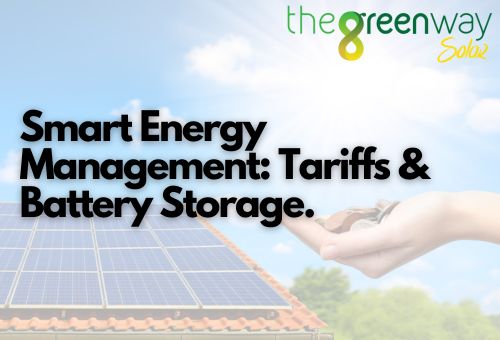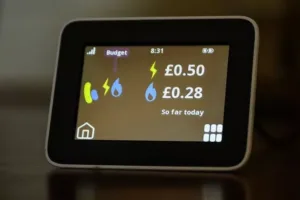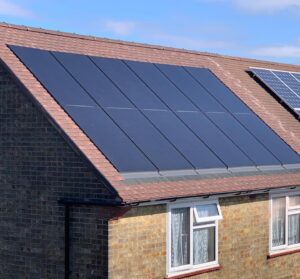
Smart Energy Management: Tariffs and Battery Storage.
Smart Energy Management: How Time-of-Use Tariffs and Battery Storage Benefit UK Households and SMEs
In the UK, the adoption of electric vehicles (EVs) and the integration of battery storage systems are at the forefront of the shift towards a more sustainable and energy-efficient future. Time-of-use tariffs, such as Octopus Go or Economy 7, offer a strategic advantage by providing cheaper electricity rates during off-peak hours, usually at night. This approach is not only suitable for households but also presents a valuable opportunity for Small and Medium-sized Enterprises (SMEs) to control energy costs. Let’s explore the benefits of these tariffs and how they can be optimally utilised for charging EVs, powering homes, and supporting business operations.

1. Environmental Benefits: Enhancing Green Credentials
Utilising electricity during off-peak times often aligns with periods when the national grid is under less stress and more likely to be supplied by renewable sources. For both households and SMEs, this means the energy used to charge EVs or to operate businesses is cleaner, helping to reduce the overall carbon footprint and support the UK’s environmental targets.
2. Stabilising the Energy Supply Network
By encouraging electricity consumption during off-peak hours, time-of-use tariffs help to distribute demand more evenly across the day and night. This not only alleviates pressure on the grid during peak times but also contributes to its stability and reliability, a critical factor as the grid evolves to support an increasing reliance on electric power for transport and business operations.

3. Cost Savings and Operational Efficiency for Households and SMEs
For individual consumers and SMEs alike, these tariffs can lead to significant reductions in electricity bills. Charging EVs and using battery storage to shift energy usage to cheaper, off-peak times can cut costs considerably. For businesses, this can mean lower operational expenses and enhanced profitability. Additionally, smart technology can automate energy usage patterns, further optimising cost savings and efficiency.
4. SME-Specific Benefits: Battery Storage for Energy Cost Management
For SMEs, battery storage systems offer a unique advantage. By storing cheap, off-peak electricity, businesses can use this stored energy during peak hours, when electricity rates are higher. This not only provides cost savings but also offers a hedge against energy price volatility, making budgeting more predictable. Moreover, battery storage can serve as a backup power source, ensuring business continuity during outages.
5. Leveraging Solar Power for Greater Savings
Combining solar PV systems with battery storage and time-of-use tariffs can maximise benefits. During daylight hours, solar panels generate electricity that can either be used directly, stored for later use, or sold back to the grid, potentially generating income through schemes like the Smart Export Guarantee (SEG). At night, businesses and households can then draw on cheap, off-peak grid electricity or use their stored solar energy, optimising energy costs and usage.
A Strategy for Sustainable Growth
Adopting time-of-use tariffs and battery storage is a strategic move for UK households and SMEs alike, enabling them to contribute to a more sustainable future while managing energy costs effectively. This approach not only aligns with environmental objectives but also offers practical benefits in terms of cost savings and operational efficiency. As the UK continues to evolve its energy infrastructure, embracing these technologies and tariffs will be key to achieving a greener, more sustainable, and economically efficient future.
Ready to take the next step in smart energy management?
Contact us today to discover how our bespoke solar and battery storage solutions can help you maximise savings, enhance energy efficiency, and contribute to a more sustainable future. Whether you’re a homeowner or an SME, we’re here to guide you through every step of the transition to renewable energy.
Visit our website or call us now for a free consultation.













